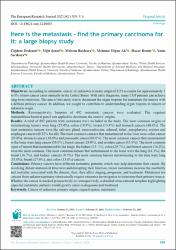Here is the metastasis - find the primary carcinoma for it: a large biopsy study
Citation
Özdemir, Ç., Şenol, Y., Baykara, M., Ak, M. O., Demir, H., & SARIKAYA, Y. (2023). Here is the metastasis-find the primary carcinoma for it: a large biopsy study. The European Research Journal, 9(2), 309-316.Abstract
Objectives: According to estimates, cancer of unknown primary origin (CUP) accounts for approximately 3 to 5% of new cancer cases annually in the United States. With early diagnosis, many CUP patients can achieve long-term remission. The aim of this study was to document the organ tropism for metastasis for tumors with a definite primary cancer. In addition, we sought to contribute to understanding organ tropism in tumors of unknown origin. Methods: Retrospectively, biopsies of 492 metastatic cancers were evaluated. The required immunohistochemical panel was applied to determine the tumors’ origins. Results: A total of 492 patients with metastases were included in the study. The most common origins of metastasizing tumors were lung (25.4%), colon (18.9%), breast (15.4%) and stomach cancers (10.6%). The least metastatic tumors were the salivary gland, neuroendocrine, adrenal, tubal, nasopharynx, rectum and esophagus cancers (0.22% for all). The most common cancers that metastasized to the liver were colon cancer (29.0%), stomach cancer (18.6%) and pancreatic cancer (18.6%). The most common cancers that metastasized to the bone were lung cancer (58.0%), breast cancer (29.0%), and prostate cancer (13.9%). The most common types of tumors that metastasized to the lungs, the kidney (35.1%), colon (29.7%), and breast cancers (16.2%), were the most common. The most common tumors that metastasized to the brain were the lung (61.1%), the breast (16.7%), and kidney cancers (8.7%). The most common tumors metastasizing to the skin were lung (31.0%), breast (27.6%), and colon (13.8%) cancers. Conclusions: Primary cancers have different metastatic patterns, which may help determine their causes. By involving distant anatomical structures and disrupting their function, tumor metastases increase the morbidity and mortality associated with the disease; thus, they affect staging, prognosis, and treatment. Metastases (or cancers from unknown primary sites) usually require extensive investigation to determine their primary source. Whether the cancer is tracked prospectively or retrospectively, a detailed observational template highlighting expected metastatic patterns would greatly assist in diagnosis and treatment.
















